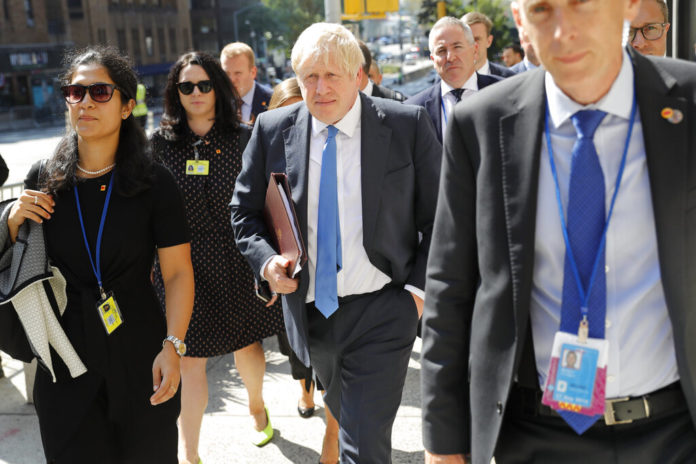September 23, 2019 7:00 pm
United Nations – Britain joined the United States on Monday in blaming Iran for attacks on key oil facilities in Saudi Arabia, but the Iranian foreign minister pointed to claims of responsibility by Yemeni rebels and said: “If Iran were behind this attack, nothing would have been left of this refinery.”
Fallout from the Sept. 14 attacks is still reverberating as world leaders gather for their annual meeting at the U.N. General Assembly and international experts continue, at Saudi Arabia’s request, to investigate what happened and who was responsible.
British Prime Minister Boris Johnson said late Sunday while flying to New York that the U.K. is now “attributing responsibility with a very high degree of probability to Iran” for the attacks by drones and cruise missiles on the world’s largest oil processor and an oil field. He said the U.K. would consider taking part in a U.S.-led military effort to bolster Saudi Arabia’s defenses.
Iran’s foreign minister, Mohammad Javad Zarif, denied any part in the attacks. He said Yemen’s Houthi rebels, who claimed responsibility, “have every reason to retaliate” for the Saudi-led coalition’s aerial attacks on their country.
He also stressed that on the eve of President Hassan Rouhani’s visit to the United Nations — which sits in the middle of New York City — “it would be stupid for Iran to engage in such activity.”
France has been trying to find a diplomatic solution to U.S.-Iranian tensions, which soared after the Saudi attacks.
French President Emmanuel Macron told reporters Sunday en route to New York that he still hopes to mediate between Trump and Rouhani, saying “something may happen.” The French leader said he remains “cautious” in attributing responsibility for the Saudi attacks.
Zarif, however, ruled out any such meeting. He said Iran had received no request from the U.S., “and we have made clear that a request alone will not do the job.”
He said Trump “closed the door to negotiations” with the latest U.S. sanctions, which labeled the country’s central bank a “global terrorist” institution — a designation the Iranian minister said the U.S. president and his successors may not be able to change.
“I know that President Trump did not want to do that. I know he must have been misinformed,” said Zarif, meeting with U.N. correspondents Monday.
Zarif said he plans to meet Wednesday with ministers of the five countries remaining in the 2015 nuclear deal from which Trump withdrew — Russia, China, Britain, France and Germany.
Johnson, the U.K. prime minister, said he would “be working with our American friends and our European friends” to reduce Middle East tensions.
Shortly before leaving for the U.N. meetings Monday, Iran’s Rouhani said on state television that his country will invite Persian Gulf nations to join an Iranian-led coalition “to guarantee the region’s security.”
Rouhani said the plan is not limited to security but also encompasses economic cooperation and an initiative for “long-term” peace. He planned on presenting details while at the United Nations.
Iran’s president had already called on Western powers Sunday to leave the security of the Persian Gulf to regional nations led by Tehran.
Zarif said the new Hormuz Peace Initiative — with the acronym HOPE — would be formed under a U.N. umbrella with two underlying principles: nonaggression and noninterference. He said it would require a major shift from countries “buying” security from other nations or mercenaries, and instead promote the notion that “you can gain security relying on your own people and working with your neighbors.”
Johnson said he would meet Rouhani at this week’s high-level U.N. gathering. He said he wanted Britain to be “a bridge between our European friends and the Americans when it comes to the crisis in the Gulf.”
Johnson stressed the need for a diplomatic response to the Gulf tensions but said Britain would consider any request for military help. The Trump administration announced Friday that it would send additional U.S. troops and missile defense equipment to Saudi Arabia and the United Arab Emirates as part of a “defensive” deployment. Officials said the number of troops was likely to be in the hundreds.
“We will be following that very closely,” Johnson said. “And clearly if we are asked, either by the Saudis or by the Americans, to have a role, then we will consider in what way we could be useful.”
A U.K. official told The Associated Press that a claim of responsibility for the attacks by Iran-allied Houthi rebels in Yemen was “implausible.” He said remnants of Iran-made cruise missiles were found at the attack site, and “the sophistication points very, very firmly to Iranian involvement.”
The official, who spoke on the condition of anonymity to discuss intelligence findings, did not say whether Britain believed the attack was launched from Iranian soil. Iran denies responsibility and has warned any retaliatory attack targeting it will result in an “all-out war.”
Meanwhile Monday, Iranian government spokesman Ali Rabiei suggested the release of a British-flagged oil tanker held by Tehran since July would be imminent, though he doesn’t know when the vessel will leave.
The Stena Impero has not turned on its satellite-tracking beacon in 58 days, nor has there been any sign that it has left its position off the Iranian coast near the port city of Bandar Abbas.
Iran’s Revolutionary Guard seized the Stena Impero after authorities in Gibraltar seized an Iranian crude oil tanker. That ship has since left Gibraltar, leading to hopes the Stena Impero would be released.
(AP)
